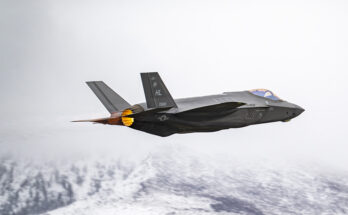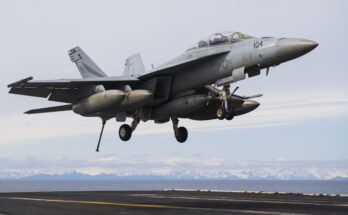The Taiwanese military is ready to forsake its previous ambition to acquire the F-35 Lightning II stealth combat aircraft in favor of a government-to-government contract for 66 F-16V Block 70 jet fighters. The latter are intended to replace the current inventory of Northrop F-5E Tigers that were brought into service in the 1970s.
Taiwan is already in the process of upgrading its existing stock of 145 F-16A/B fighters to the latest Lockheed Martin F-16V (Viper) configuration under a roughly $4.2 billion program referred to by Taiwan as the “Phoenix Rising” project.
The latest plan by the Taiwanese Air Force is effectively a reboot of an earlier effort to procure 66 new-build F-16C/D Block 50/52 fighters.
Taiwan tried to submit letters of request for price-and-availability data on these aircraft on four separate occasions from 2006 onward, with the most recent being an effort to convince the U.S. government to grant it access to a squadron of F-16C/D Block 50/52 jet fighters in order to plug a capabilities gap that would open up during the lengthy Phoenix Rising upgrade process on the existing Taiwanese F-16 fleet. These requests were all deferred by successive White House administrations, largely due pressure from China. With Beijing warning that such a sale would cross a “red line” the Obama administration opted to ignore the Taiwanese request rather than risk antagonizing China.
Now with a new administration in the White House – one more willing to risk Beijing’s ire in the areas of U.S.-Sino trade and diplomacy with Taiwan – the Taiwanese are holding out hope that a potential $10 billion foreign military sale (FMS) request to the U.S. might be granted approval.
Taiwan hints F-16V fighter jets are back on its defence shopping list https://t.co/37uij3VEKo
— SCMP News (@SCMPNews) November 29, 2018
Even under the “Buy American” export sales approach of the Trump administration a sale of the new-generation F-35 Lightning II was always going to an extreme long-shot proposition. Policy-makers in Washington have remained firmly opposed to such a sale out of concerns over China, both in diplomatic terms and for security reasons (susceptibility of Taiwanese military to Chinese espionage).
Most importantly for Taiwan, the U.S. is reportedly amenable towards possibly licensing to Taiwan the intellectual property and manufacturing expertise for F-16V production. Such an arrangement would dovetail with Taiwanese President Tsai Ing-wen’s defense industrial indigenization agenda involving locally-sourced weapons systems designed, produced and serviced by Taiwan. This strategy is viewed as a necessity in order to avoid dependence upon foreign suppliers (namely the United States) and risk being cut off from sales or after-sales support due to fears of backlash from Beijing.
Approval of such a large-scale procurement of F-16V fighters would ensure Taiwan’s Air Force retains ample fighter capacity and substantial capability in light of the current Phoenix Rising upgrade project and the Air Force’s other upgrade program to its Indigenous Defense Fighters (IDFs, or FC-K-1 Ching kuo fighters) built by state-run Aerospace Industrial Development Corporation (AIDC).
Finding room in Taiwan’s ever-tightening defense budget for such a substantial, pricey procurement, however, might prove more difficult. While Tsai Ing-wen’s administration has, like its predecessor, vowed to bolster defense spending the 2018 defense earmarked amounted to a mere 0.8 percent real-term increase. Overall, Taiwan’s defense investment level has remained flat for more than 10 years, and, since the global economic slowdown began in late 2008, the country’s topline defense budget has slipped from TWD341 billion (2008 earmark) to TWD328 billion, a 3.8 percent nominal decline.
Taiwan’s laws restricting levels of deficit spending almost ensure that no substantial uptick in the defense budget will be forthcoming without first cutting into social and economic programs. With Tsai’s government already under pressure for trying to reduce Taiwan’s generous military and civil service pensions and her Democratic Progressive Party losing ground in recent local elections finding a more money for defense might require utilizing a carve-out special fund within the government budget. Otherwise paying for an ostensible F-16V acquisition project will fall on successive defense budgets and limit investment flexibility for other Ministry of Defense projects.
Dan Darling is Forecast International’s director of military and defense markets. In this role, Dan oversees a team of analysts tasked with covering everything from budgeting to weapons systems to defense electronics and military aerospace. Additionally, for over 17 years Dan has, at various times, authored the International Military Markets reports for Europe, Eurasia, the Middle East and the Asia-Pacific region.
Dan's work has been cited in Defense News, Real Clear Defense, Asian Military Review, Al Jazeera, and Financial Express, among others, and he has also contributed commentary to The Diplomat, The National Interest and World Politics Review. He has been quoted in Arabian Business, the Financial Times, Flight International, The New York Times, Bloomberg and National Defense Magazine.
In addition, Dan has made guest appearances on the online radio show Midrats and on The Media Line, as well as The Red Line Podcast, plus media appearances on France 24 and World Is One News (WION).




